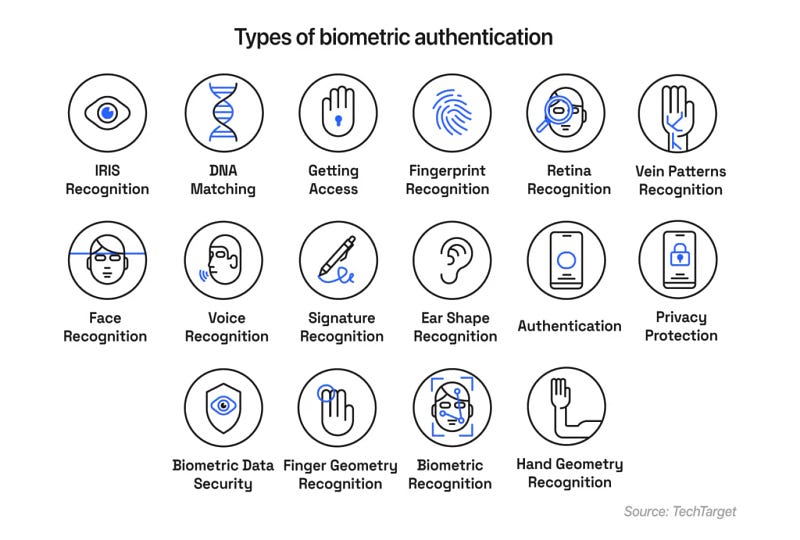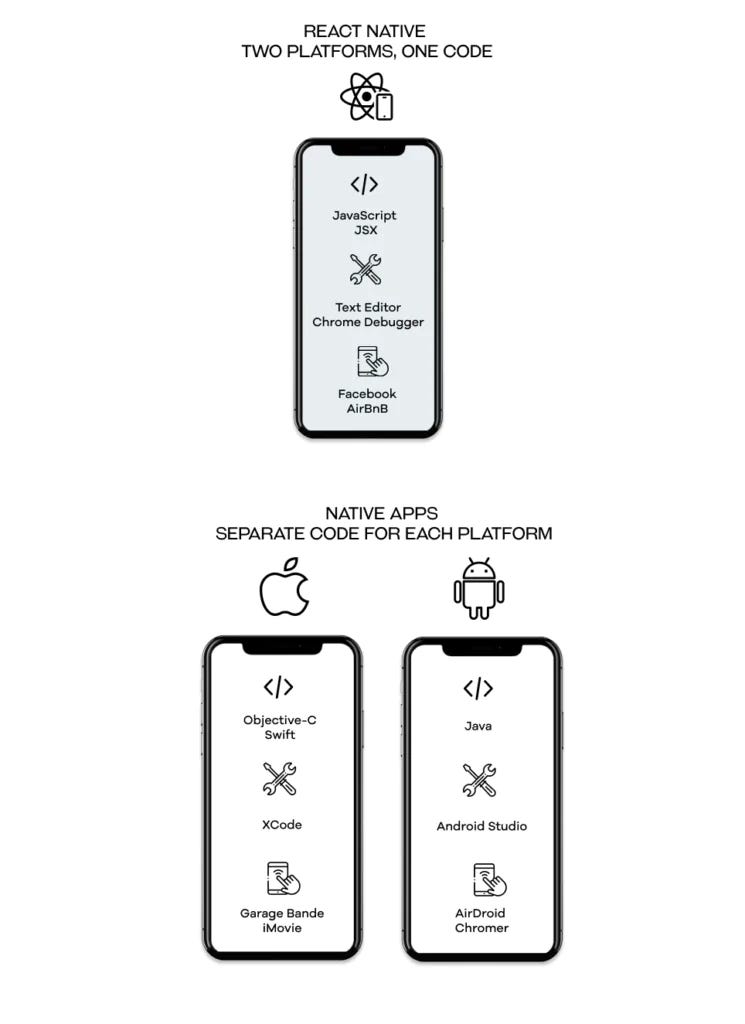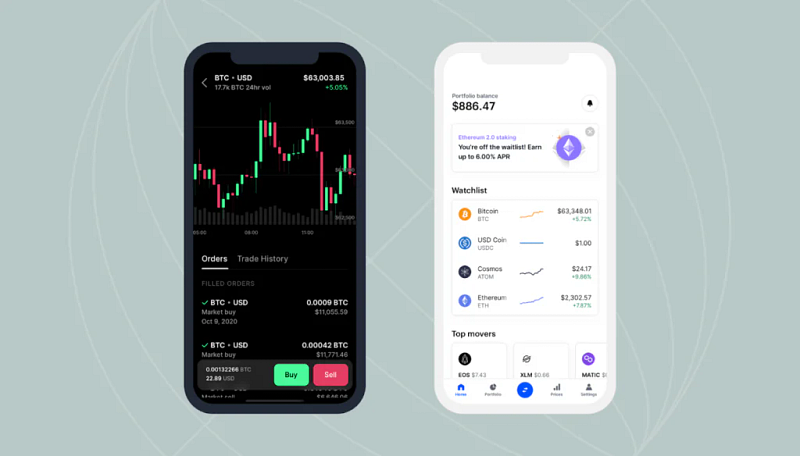Introduction
Cryptocurrencies have rapidly grown from a niche interest to a mainstream financial instrument in recent years. With this growth, the demand for secure, efficient, and user-friendly crypto wallet applications has rushed. Whether the user wants to manage Bitcoin, Ethereum, or other digital assets, he needs a reliable wallet app that works on different devices — but especially on mobiles.

Number of identity-verified crypto asset users from 2016 to November 2023*(in millions)*; Source: Statista
React Native, a popular framework for building cross-platform mobile applications offers an excellent solution for developing a crypto wallet app. It’s already used widely among crypto wallet providers. Today we will explain why, and explore the key features that a React Native-powered crypto wallet can offer, including secure authentication, DApp interactions, blockchain integration, and real-time updates.
Understanding The Requirements For A Crypto Wallet App
Developing a crypto wallet app requires integrating several essential features to meet both user needs and industry standards. At its core, a crypto wallet must offer secure storage for private keys, user-friendly transaction management, real-time balance updates, and support for multiple cryptocurrencies. Ensuring robust security measures, such as encryption, biometric authentication, and two-factor authentication, is vital to protect user assets and data.
Main Features of the Cryptocurrency Mobile Wallet App
For High Security
Encryption: End-to-end encryption to protect user data and transactions.
Two-Factor Authentication (2FA): Adds an extra layer of security for user accounts.
Backup and Recovery: Secure backup options and a recovery mechanism in case users lose access to their wallets.
Biometric Authentication: Support for fingerprint or facial recognition.
Private Key Management: Secure storage and management of private keys, ideally with options for users to control their own keys.
Multi-signature Support: For higher security in transactions.

Source: TechTarget
For Usability
User-Friendly Interface: Intuitive and easy-to-navigate UI/UX.
Multi-Language Support: To cater to a global audience.
Customer Support: Accessible and responsive customer support options.
Transaction History: Detailed transaction logs for user reference.
Cross-Platform Compatibility: Availability on multiple operating systems (iOS, Android, etc.).
Better Functionality
Multi-Currency Support: Ability to manage and transact with various cryptocurrencies.
Real-Time Exchange Rates: Up-to-date exchange rates for different cryptocurrencies.
Transaction Speed: Fast and reliable transaction processing.
QR Code Scanner: For easy transfer of funds.
Notifications: Alerts for transactions, security issues, and updates.
Integration with DeFi Services: Access to decentralized finance services directly from the wallet.
For Compliance
Regulatory Compliance: Adherence to relevant financial regulations and standards in different jurisdictions.
KYC/AML: Know Your Customer (KYC) and Anti-Money Laundering (AML) procedures to ensure legal compliance.
Tax Reporting: Tools for users to generate tax reports based on their transactions.
Additional Features
Customizable Fees: Options for users to set their own transaction fees.
Cold Storage: Support for cold storage solutions for added security.
Social Recovery: Mechanisms for social recovery of wallets.
Decentralized Application (DApp) Browser: To interact with various DApps directly through the wallet.
Ensuring these requirements are met will lay a strong foundation for developing a robust and compliant crypto wallet app. With React Native, you can fulfill all of the above — and what’s more, for both iOS and Android at once!
Why Choose React Native For Crypto Wallet Development
React Native is the optimal framework for developing a cryptocurrency wallet app due to its powerful combination of cross-platform capabilities, efficiency, and robust performance. It’s already used and checked by the market leaders, i.e. Coinbase.
Below we explain why it’s great for this type of app:
Cross-Platform Development
React Native allows developers to write a single codebase that runs on both iOS and Android platforms. This reduces development time and costs and ensures feature parity across both platforms. For a crypto wallet app, which requires consistent and secure implementation of features like end-to-end encryption, two-factor authentication, and private key management, React Native provides a streamlined approach to maintain uniformity and high standards across different devices.

Source: Pagepro
Regulatory Compliance and Security
React Native’s flexibility allows developers to implement stringent security measures and ensure regulatory compliance. It includes adherence to Know Your Customer (KYC) and Anti-Money Laundering (AML) regulations, which are critical for operating legally and gaining user trust. Additionally, React Native’s capabilities make it easier to integrate features for tax reporting and other regulatory requirements.
High Performance and Responsiveness
React Native’s architecture is designed to deliver high-performance applications. By leveraging native components and APIs, React Native ensures that the app’s performance is close to native apps built separately for iOS and Android. This is crucial for crypto wallet apps where speed and reliability are essential, particularly for real-time features such as transaction processing, real-time exchange rates, and notifications.
Rich Ecosystem and Pre-built Components
The React Native ecosystem is vast and continuously growing, with a plethora of pre-built components and libraries. A rich ecosystem accelerates the development process, allowing developers to integrate complex features like QR code scanning, biometric authentication, and multi-signature support with minimal effort. Additionally, the inbuilt browser for seamless transaction approvals and integration with decentralized finance (DeFi) services can be efficiently implemented using existing tools within the React Native community.
Cost Efficiency
By using React Native, businesses can significantly cut down on development costs. A single team can work on both iOS and Android versions of the app, eliminating the need for separate teams and reducing project overhead. This cost efficiency is particularly advantageous for startups and companies looking to optimize their budget while delivering a high-quality product. That was one of the reasons why Coinbase decided to migrate their cryptocurrency wallet to React Native:
What if we could reduce a healthy feature team from 8 — with each client engineering pair being isolated on a separate platform — to 5 engineers — where multiple client engineers could work across all three platforms.
We hypothesized that this could dramatically reduce our overall staffing requirements, improve our team’s effectiveness, and increase the connectedness of engineers on our client platforms. At the same time, we also believed that gaining efficiency couldn’t be the only goal; any technology change we made also had to deliver improved quality and performance for our customers. This line of thinking led us to start looking at different cross-platform technologies.
Harry Tormey, Coinbase
User Experience
React Native enables the creation of a user-friendly interface that is both intuitive and responsive. The framework’s ability to create smooth animations and transitions ensures a seamless user experience. For a crypto wallet app, this means providing users with an easy-to-navigate interface, clear transaction histories, and quick access to customer support, all of which enhance overall user satisfaction.
Community and Support
The React Native community is one of the largest and most active in the development world. This means continuous improvements, a wealth of resources, and support from experienced developers. For companies building a crypto wallet app, this community support translates to access to the latest best practices, troubleshooting tips, and innovative solutions to common development challenges.
Real-World Examples
React Native has been successfully used by leading crypto wallets like Coinbase. It highlights the framework’s capability to support complex features and ensure robust performance.

Source: Announcing Coinbase’s successful transition to React Native
Coinbase achieved ambitious targets for user journeys through observability, goal alignment, and taking a three-pronged approach to optimization: improving client architecture, making backend services faster, and product innovation. Performance excellence is now even more ingrained in our culture, driving every product change and feature launch. We are proud of the updates we have made to maintain a world class React Native app and we will continue to do the work necessary to continue to improve the experience for our users.
Jacqueline Teran, Brendan Lynch; Coinbase Blog
Technical Advantages Of React Native For Crypto Wallets
Developing a crypto wallet app with React Native offers several technical advantages that streamline development, enhance performance, and ensure a high-quality user experience. Here are some of the key technical benefits:
Hot Reloading for Faster Development and Testing
Hot Reloading is a standout feature of React Native that significantly speeds up the development process. It allows developers to instantly see the results of the latest change made to the code without reloading the entire app:
Immediate Feedback: Changes in the code are reflected instantly, enabling developers to test and debug more efficiently.
Increased Productivity: Reduces the time spent on recompiling and reloading, thus accelerating the development cycle.
Efficient Use of Resources and Performance Optimization
React Native is designed to optimize performance and make efficient use of resources:
Native Components: Utilizes native components to ensure high performance and smooth operation, similar to apps built with native code.
Resource Management: Efficiently manages resources to minimize memory usage and improve app responsiveness, which is crucial for handling real-time data and transactions in crypto wallets.
Easy Integration with Existing Backend Services and APIs
React Native facilitates seamless integration with existing backend services and APIs, making it easier to connect with blockchain networks and other necessary services:
Backend Compatibility: Compatible with various backend technologies, allowing for straightforward integration with REST APIs, GraphQL, and other data sources.
Flexibility: Supports integration with third-party libraries and services, enabling the implementation of complex functionalities such as real-time updates, notifications, and transaction management.
Modular and Reusable Components
The modular and reusable components in React Native improve development efficiency and maintainability:
Component Reusability: Allows developers to create reusable components that can be easily integrated across different parts of the app, ensuring consistency and reducing duplication of effort.
Modular Architecture: Promotes a modular approach to app development, making it easier to manage and scale the app. This is particularly beneficial for implementing features like secure authentication, transaction history, and multi-currency support.
Conclusion
Building a crypto wallet app with React Native offers numerous benefits, including cross-platform development, high performance, and efficient use of resources. Key features such as secure authentication mechanisms, real-time updates, and seamless integration with various blockchain networks are easily implemented with React Native. Additionally, the framework’s support for modular and reusable components, along with tools like WebView for embedding inbuilt browsers, boosts both the development process and user experience. And of course, React Native greatly addresses the biggest challenge of the crypto apps — keeping the highest security standards.
Read More
What Is React Native? — Intro To Top Mobile Framework
React Native For Web — Write Once, Run Anywhere
Sources
Number of identity-verified cryptoasset users from 2016 to November 2023

